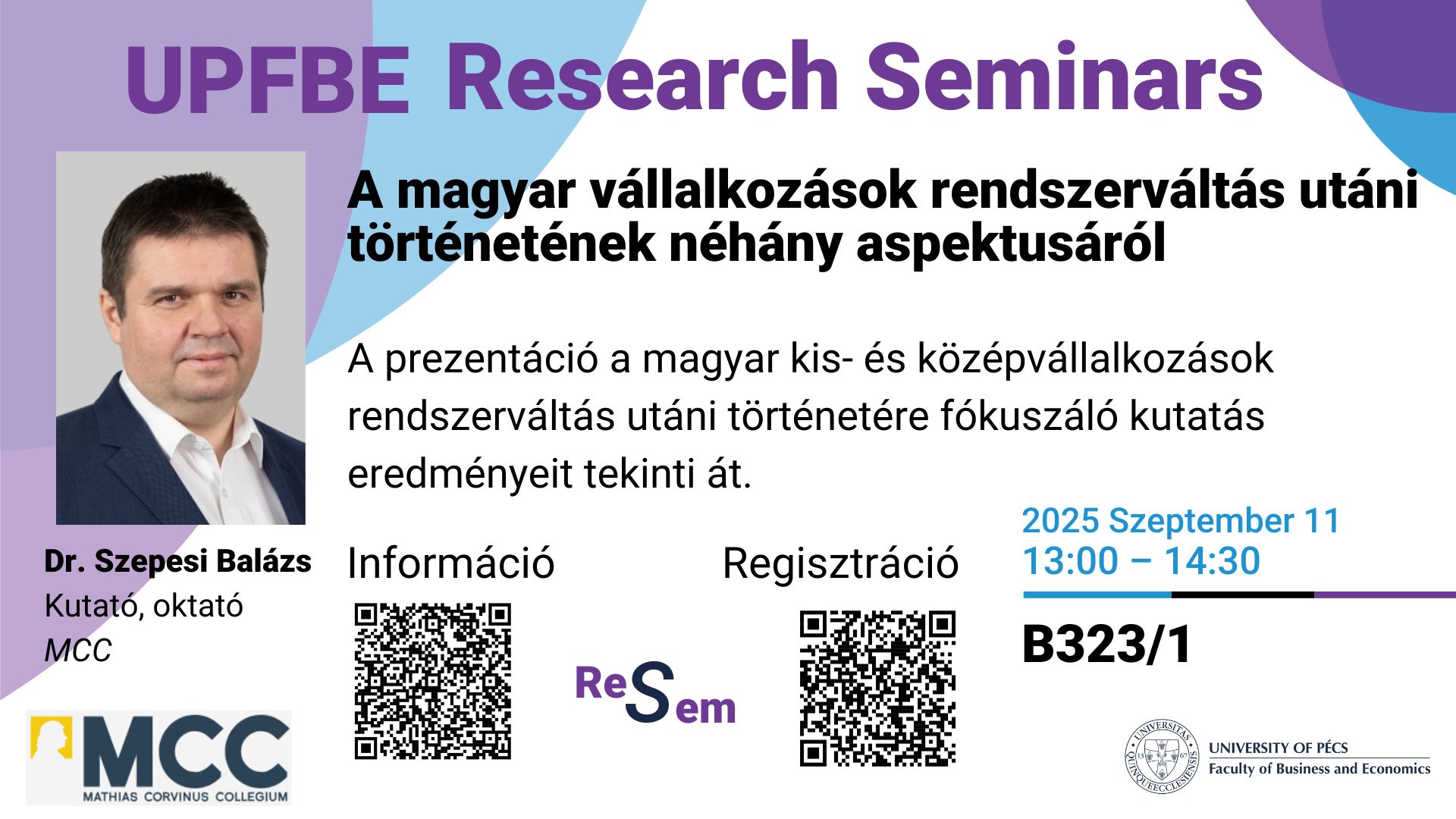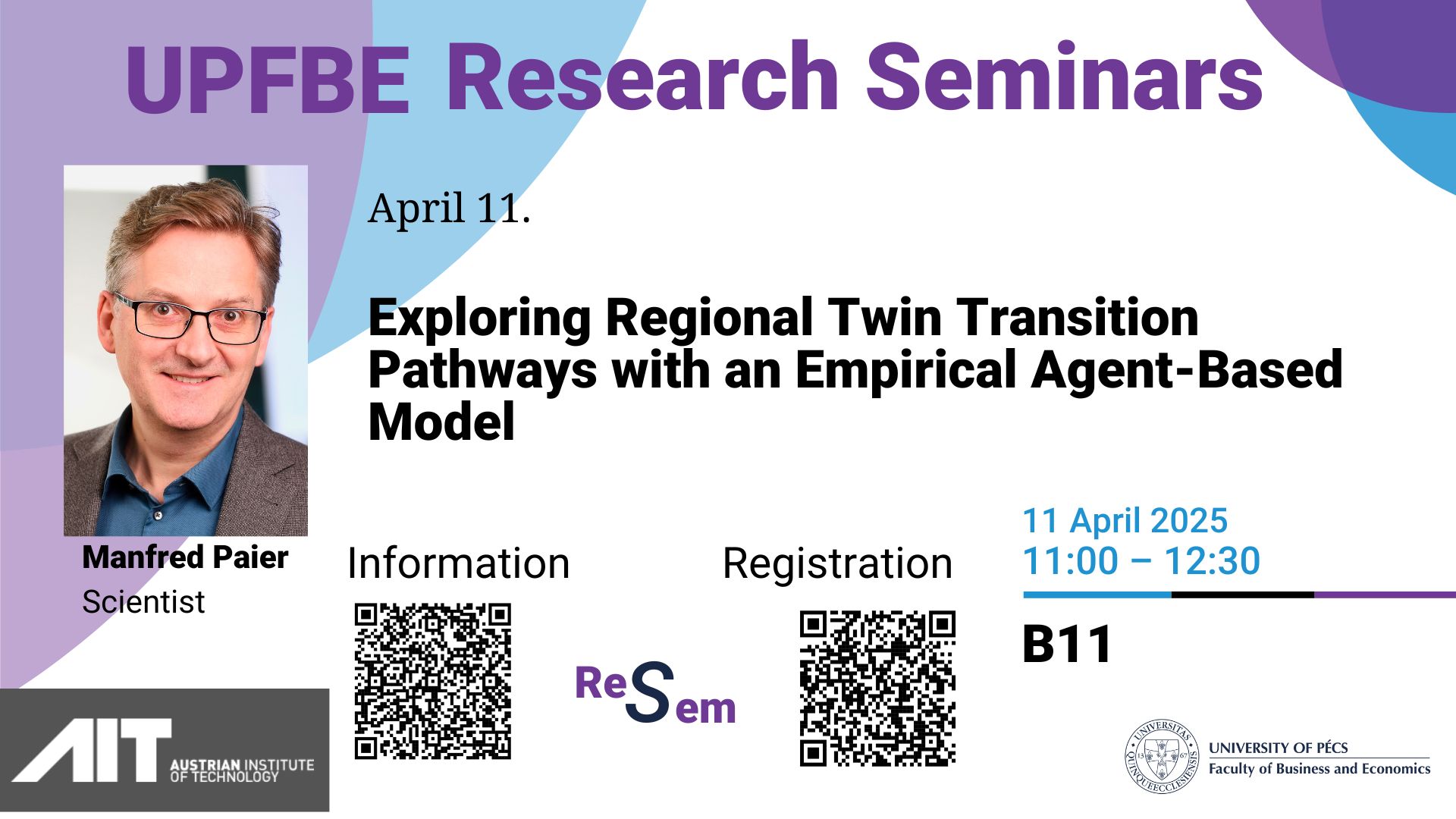Kutatói szemináriumok
2025
Kutatói Szemináriumok programjai novemberben
| November 14. | B310 | 10:00 - 11:30 |
Dr. Gyimesi András Cím: A panel adatok és módszerek jelentősége a közgazdasági kutatásokban Leírás: A legtöbb kutatási kérdés „x hogyan hat y-ra?” formában írható fel. Ilyen esetben rendkívül fontos az endogenitás kiküszöbölése, hogy valóban x hatását mérjük meg y-ra, minél kevesebb torzítással. Áttekintem, hogyan tud ebben segíteni egy panel adatállomány. Ha az adatok rendelkezésre állnak, abban az esetben is fontos, hogy megfelelő módszert válasszunk. Ezek közül a leggyakrabban használtak a difference-in differences, fixed effect, a first-difference, és a dinamikus panel módszerek. Ezek kerülnek bemutatásra, különös tekintettel arra, hogy melyiket mikor és mikor nem érdemes alkalmazni. | ||

| November 5. | B323/1 | 13:00 - 14:30 |
PhD. Prateek Kalia Cím: Cellulographics©: A Next-Generation Framework for Smartphone-Based Consumer Segmentation Abstract This seminar introduces Cellulographics©, a behavioral segmentation framework that categorizes individuals based on their actual smartphone usage rather than static socio-demographic factors. Traditional approaches, such as demographic, psychographic, and technographic lenses, often fall short in digital contexts. Cellulographics addresses this gap by concentrating on usage-level factors like experience and skills, frequency and duration of use, screen time, activities, and contexts or locations. I will outline the conceptual model, discuss measurement approaches, and demonstrate how Cellulographics complements the current technology-centric world, informing research in mobile commerce, HCI, digital health, and digital well-being. Empirical pathways include scale development and validation, segmentation-driven experiments, and cross-cultural comparisons. The session will highlight implications for both scholarship and practice, focusing on design, personalization, and policy. I will conclude by inviting colleagues to collaborate on joint projects and publications, including comparative studies leveraging datasets and field settings. | ||

Kutatói Szemináriumok programjai szeptemberben
Az esemény rövid össezfoglalója itt érhetrő el.
| Szeptember 11. | B323/1 | 13:00 - 14:30 |
Dr. Szepesi Balázs Cím: A magyar vállalkozások rendszerváltás utáni történetének néhány aspektusáról – indulás, akadályok, hajtó erők, stratégiai fókuszok Absztrakt: A prezentáció a magyar kis- és középvállalkozások rendszerváltás utáni történetére fókuszáló kutatás eredményeit tekinti át. Az MCC vállalkozáskutatási műhelyének projektje mélyinterjúkra, széleskörű szakirodalom feldolgozásra és szakértői workshopokra támaszkodva vizsgálja, hogyan hatott a vállalkozások működésére a külső környezet, illetve milyen motivációkra építve milyen stratégiai válaszok határozták meg a cégek működését. Az előadás a témát tárgyaló könyvfejezet előzetes eredményeit mutatja be és diszkutálja. | ||

Kutatói Szemináriumok programjai áprilisban
Az esemény rövid össezfoglalója itt érhetrő el.
| Április 11. | B311 | 11:00 - 12:30 |
Manfred Paier Title: Exploring Regional Twin Transition Pathways with an Empirical Agent-Based Model Abstract: The twin transition—an integrated approach to digitalization and green innovation—is central to the European Union’s strategy for addressing climate change while fostering economic competitiveness. However, European regions exhibit significant heterogeneity in innovation capacities, industry structures, and institutional frameworks, affecting their ability to navigate this transition effectively. This ongoing project explores regional twin transition pathways by analysing the transformation of technological knowledge bases using an empirical agent-based model (ABM). We employ an ABM that simulates knowledge creation processes in 292 NUTS2 regions across Europe. The model represents 70,000 heterogeneous agents, characterized by sectoral affiliations, R&D intensities, and technological endowments, and specifies agent interactions for learning and knowledge exchange. It examines the mechanisms through which regions advance toward green and digital specialization, identifying pathways such as related and unrelated diversification, upgrading, and importation. By incorporating spatial microsimulation techniques and patent data from 2015–2020, we quantify regional specializations in green and digital technologies, allowing us to assess the impact of pre-existing capabilities on transition trajectories. First results indicate that regions with established green and digital knowledge bases predominantly follow related diversification, reinforcing existing expertise. Conversely, less technologically advanced regions rely on importation and unrelated diversification, facing greater structural challenges in transitioning toward twin specialization. Spatial spillover effects further influence transition dynamics, with advanced regions in Germany, Scandinavia, and Southern France leading the twin transition, while Eastern and South-Eastern European regions exhibit lagging trends. These findings highlight the evolutionary nature of technological transitions and the role of regional characteristics in shaping twin transition pathways. Future research will extend the model to assess policy interventions fostering interregional collaboration and diversification, providing insights for targeted innovation strategies. | ||

